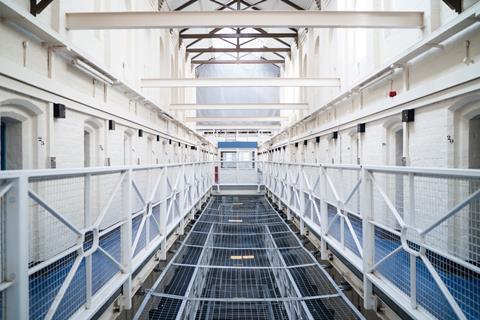Companies could lose right to sponsor visas if they do not back party’s training plans
Labour has promised to change the planning status of prison projects to speed up delivery, stamp out late payments and place curbs on construction firms seeking to employ migrants.
The party announced a slew of new policies over the weekend, several of which are likely to have a significant impact on the built environment sector.

If elected in July, the party plans to designate all prison projects as ‘nationally important’, using the provisions of the 2008 Planning Act.
The measure, through which is aims to deliver 14,000 additional prison places by 2030, would put planning decisions for prisons in the hands of ministers rather than local authorities.
Shadow justice secretary Shabana Mahmood told The Telegraph that “not in my back yard-style concerns” about new prisons in Labour MPs’ constituencies would be rebuffed.
She said the move would put an end to a situation “where the planning process essentially gets in the way and prevents prison capacity from being delivered in this country”.
“We will not allow delay and dither and ridiculous complaints to get in our way.”
She also committed to “look at the costings” of former home secretary Lord Blunkett’s recent suggestion to create a network of mini-prisons across the UK.
The party also announced a set of policies aimed at boosting small and medium-sized enterprises, including a promise to stamp out late payment of invoices by requiring large businesses to better report on their payment practices.
Labour also said it would open up competition to public contracts, giving small businesses a better chance to compete in tenders by requiring at least one SME to be shortlisted when smaller contracts go to tender.
>> Read more: How post-Brexit visa rules are affecting immigrant worker sponsorship
It also promised to create a new body, Skills England, which would work with local industry to ensure local people have the skills they want, including new Technical Excellence Colleges.
On the skills issue, the party also announced plans at the weekend to pass a new law which would force different parts of the government to draw up skills improvement plans in high migration sectors.
Construction is one of four sectors said to have been identified by Labour as required improved training, alongside health and social care, engineering and IT.
Shadow home secretary Yvette Cooper told the BBC that Labour would seek to block companies from sponsoring visas for overseas employees if they refused to comply with plans to train British workers.
Election focus

With the UK set for a general election on 4 July, the country is facing some serious problems.
Low growth, flatlining productivity, question marks over net zero funding and capability, skills shortages and a worsening housing crisis all amount to a daunting in-tray for the next government.
This year’s general election therefore has very high stakes for the built environment and the economy as a whole. For this reason,
Building’s election coverage aims to help the industry understand the issues and amplify construction’s voice so that the parties hears it loud and clear.



























No comments yet